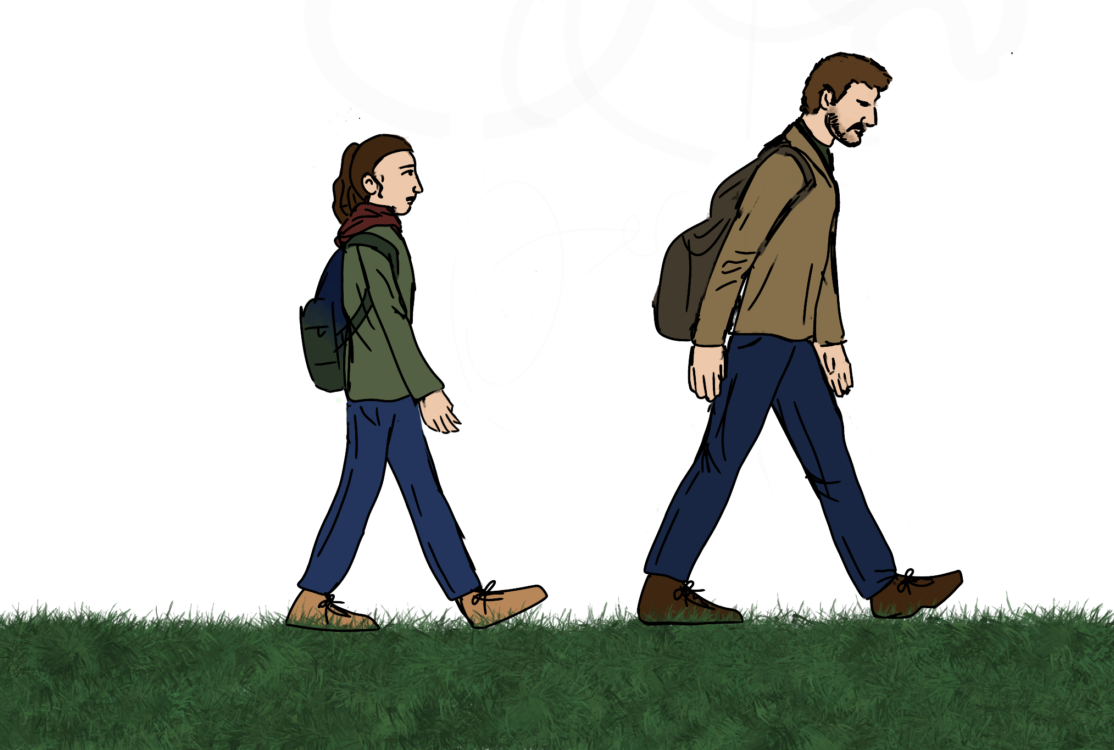Your donation will support the student journalists of the Evanstonian. We are planning a big trip to the Journalism Educators Association conference in Nashville in November 2025, and any support will go towards making that trip a reality. Contributions will appear as a charge from SNOSite. Donations are NOT tax-deductible.
Don’t be the last person to watch “The Last of Us”
April 20, 2023
What’s the goal of an apocalypse story? Is it to depict a chaotic event where people run around and scream before they are inevitably ripped open by the sharp teeth of an undead monster? Or is the goal to share stories that capture the love that accompanies tragic loss? Many apocalyptic stories showcase the blood and death that accompanies a disaster to give audiences a treat, and while it’s thrilling and undoubtedly fun to watch the infected run around for two hours, HBO’s The Last of Us, based on the game of the same name, displays a more realistic adventure with realistic, heartbreaking emotions, creating more of a spectacle than just blood and guts.
Twenty years after a fungus ravaged the world and infected almost everyone in existence, two survivors of the outbreak, Joel, a hardened man (Pedro Pascal) and Ellie, a girl born after Outbreak Day, (Bella Ramsey) go on an adventure and strengthen their bond to become stronger than the infected that rule the world.
Creators Neil Druckman and Craig Mazin accomplished something glorious with the opening episode, expertly crafting one of the greatest pilots of all time. We are quickly introduced to the show’s capacity for a harrowing gut punch as we follow Joel and his daughter through the chaos of Outbreak Day. As the episodes progress and Joel and Ellie grow closer and closer, the show masterfully combines relationships and infecred to create a suspenseful and beautifully emotional story.
By episode three, we meet Bill (Nick Offerman) and Frank (Murray Bartlett). What starts out as a survivalist story turns into a tragic love story that feels like the first ten minutes of Up (2009) stretched out for an hour. While this episode was an unexpected diversion from the main story and the plot of the game, it still flaunted The Last of Us’s creativeness and overall skill for storytelling. It’s an episode with no clickers—the undead monsters—and almost no action, but it still managed to tell a love story in an apocalypse that moved audiences to tears.
To me, that is what The Last of Us does so well. It follows an adventure through a ravaged world but only rarely involves the creatures that dismantled it. While this left many people angered at the lack of the bloodthirsty monsters that they expected, it allowed for more human stories to take the spotlight, as Joel and Ellie constantly have to traverse not only undead antagonists but living, breathing ones as well who are facing their own moral dilemmas.
This kind of gory and gripping drama is no more apparent than in episode five. As Joel and Ellie continue to grow closer, they make their way to Kansas City, where the people have taken over the city from the military and are hoping to regain order. The people’s leader Kathleen (Malanie Lynskey) has resorted to fascist-like tactics to maintain her power. This forces Joel and Ellie to team up with wanted fugitives Henry (Lamar Johnson) and his deaf younger brother Sam (Keivonn Woodard) to escape the city.
This episode began as a look at what power hungry people can do to an already unthankful society and ended as a spectacle of the destruction that monsters can bring as they bum rush out of the ground to the chorus of shooting guns. Episode five is truly a perfect balance between heart-racing clicker scenes and tear jerking emotional storylines whose essence beautifully captures the heartbreak that The Last of Us is trying to create.
However, where The Last of Us truly excels is in its core relationship. Joel and Ellie begin the show as traveling companions, with Joel treating Ellie more as cargo than as a father figure. As the series progresses, and the duo continues to battle clickers and raiders (hostile survivors), they become an unbreakable father-daughter tandem, as Joel begins to see Ellie as the daughter that he lost on Outbreak Day. Their relationship is the nucleus of the show; it’s why the series feels so powerful and why the stakes feel so high. It completes the progression of making a zombie show gut-wrenchingly emotional and, by the end of the show, it leaves the audience questioning the power of love and what it can do to people. By the end of the season, Joel and Ellie solidify themselves as one of the greatest TV team ups of all time.
The Last of Us feels almost revolutionary in its genre as both a video game adaptation and an undead story. As an adaptation, it beautifully captures the spirit of the game while making necessary changes that improve the story, and as an infected story it provides some of the most human stories that easily engage audiences and bring them to tears. Sunday nights on HBO continue to provide some of the most engaging shows on TV, and that continued this winter with The Last of Us.

